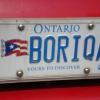訊息: 4
語言: English
BoriQa (顯示個人資料) 2013年5月28日下午12:04:31
I would have imagined that "in-laws" was "gebopatroj", which makes more sense to me.
gepatroj = parents
gebopatroj = in-laws
Can someone explain "boparenco" for me?
Is "gebopatroj" a valid synonym for "boparenco"?
Should it not be "boparencoj" since "in-laws" is plural?
Bruso (顯示個人資料) 2013年5月28日下午12:08:50
johmue (顯示個人資料) 2013年5月28日下午1:46:24
BoriQa:The translation for "in-laws" that I found in ESPDIC is "boparenco".I would say "bogepatroj"
I would have imagined that "in-laws" was "gebopatroj", which makes more sense to me.
gepatroj = parents
gebopatroj = in-laws
Can someone explain "boparenco" for me?"parencoj" (relatives) is more general than "gepatroj" (parents).
Is "gebopatroj" a valid synonym for "boparenco"?No "bogepatroj" is "parents-in-law". "boparencoj" can be any relatives-in-law, like uncle-in-law, brother-in-law, etc.
Should it not be "boparencoj" since "in-laws" is plural?If you are talking about one person which has some in-law-relation to some other person it can make sense to use boparenco in singular.
The judge in the courtroom might ask a whitness: "Ĉu vi estas parenco aŭ boparenco de la akuzito?"
Bruso:Actually I was wondering the other day if there was anything wrong with "booj".You need some indication that you are talking about persons. Indeed "bouloj" could make sense.
BoriQa (顯示個人資料) 2013年5月28日下午5:25:36
johmue:You need some indication that you are talking about persons. Indeed "bouloj" could make sense.I was refering to parents in law.
So the right term that I was looking for is then: bogepatroj
BTW, bogepatroj is indeed in ESPDIC. I was looking for the gebopratroj version, which I guess threw me off.
Thanks for the response!
Dankon!


